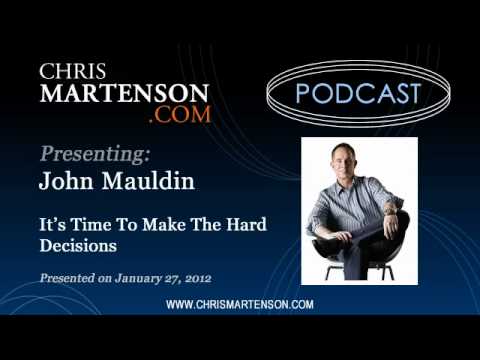We are at that point in our economy, as are most other major economies around the world, claims John Maudlin, author of the popular Thoughts from the Frontline newsletter and the recent bestselling book Endgame: The End of the Debt Supercycle and How It Changes Everything.
For the past several decades, excessive and increasing amounts of credit in the system have allowed us to live above our means as both individuals and nations. We've been able to have our cake and eat it, too. Now that the supercycle has ended and the inevitable de-leveraging cycle is staring us in the face, we will be forced to set priorities in a way that has been foreign to our society for over a generation.
On the Debt Supercycle
You can’t look to monetary policy for help (which will try to stimulate businesses to get more debt) because debt is the problem. If you are drunk and you need to cure yourself; another fifth of the whiskey is not the answer. So when debt becomes the problem, when it gets to be too much, more debt is not the issue. You've just simply got to work it off. There’s no easy way out of it. And, it takes years to work through it. It takes a long time, generally – 60 to 70 years, in the US's case – for these debt cycles to build up. It’s when you can no longer adequately service your debt and the market loses confidence in your ability to service the debt at a price that it finds adequate.
On the Slow-to-No-Growth Future
The problem is, there are only really two ways that you can deal with the debt. You can grow your way out of it, which is what you can do in normal business cycles. For most times in most places, we can grow our way out of debt problems, which is what the central bank is coming in and trying to do. The problem is, when you’re at the end of the debt supercycle, when you’re running up against your ability to borrow money, that liquidity no longer works.
As Fisher pointed out, the time to solve the debt bubble is before it becomes a bubble. He was wanting separation of commercial banks and lending. He wanted a much less fractional-reserve-based banking because he wanted the debt to keep from building up past levels that we saw in the 1920s. He saw that as something that was so bad that it created the Depression.
So you can either repudiate the debt, you can default on it, you can monetize it, you can try to grow your way out of it, but you’re going have to deal with it. And there’s no easy way, when you’re at the end of the debt supercycle, when debt has become too much. Printing money doesn’t work.
Now, upon reflection and thinking about it, we’ve gone too far. And, this is where they are in Europe. Japan is getting very, very close to that moment. I keep saying, I think Japan is a bug in search of a windshield. I think they’re going to collapse. Quite frankly, the credit crisis that Japan is going to have is going to be far more serious than Greece. Japan makes a difference. They’re a big country. Greece is an ant hill.
We in the U.S. can solve our problems, but not without paying a large price. We’re going to be locking in a slow-growth economy. It’s going to be very frustrating for politicians, because they are going to want to come in and sprinkle pixie dust on the economy and make something happen. And the reality is, we can’t. And that’s a frustrating position. It’s five or six years of slow-growth economy.
On Confidence (or Lack Thereof) in Our Leadership
There's a great line that people do not accept change until they see the necessity, and they only see the necessity in moments of crisis.
Now, sadly, simultaneously we’re seeing that much of the developed world is going to have this crisis all at the same time, you know, within three to four years of each other. That’s not good for world growth. It’s not good for globalization. We’re at a place where we have to make hard decisions.
And when you get politicians with a crisis, it’s hard to say what they’re going to do. When you read the stories of how decisions are made by politicians in the middle of a crisis, it’s not comforting. I mean, they’re picking up the phone to each other and saying, "What do you think we should do?" They are working it out as they go along. There’s no master plan here. There’s nobody with a playbook.
Click the play button below to listen to Chris' interview with John Mauldin (runtime 38m:34s):
iTunes: Play/Download/Subscribe to the Podcast
Download/Play the Podcast
Report a Problem Playing the Podcast
Or click here to read the full transcript.
John Mauldin is a financial commentator and a New York Times best-selling author. Each week, over 1 million readers turn to Mauldin for his views on Wall Street, global markets, and economic history.
Mauldin’s weekly e-newsletter, Thoughts from the Frontline, was one of the first publications to provide investors with free, unbiased information, and guidance. Today it claims to be the most widely distributed investment newsletter in the world.
Our series of podcast interviews with notable minds includes:
- Jack Keller
- Rick Rule
- Robert Rapier
- Gordon Chang
- Turd Ferguson
- Eric Janszen
- Paul Brodsky
- Carolyn Baker
- David Stockman
- Rob Hopkins
- Joel Salatin
- Charles Hugh Smith
- Frank Barbera
- Nate Hagens
- David Morgan
- James Turk
- Eric Sprott
- John Rubino
- Addison Wiggin
- Simon Black
- Axel Merk
- Paul Tustain
- Francis Koster
- Dogs_In_A_Pile
- Bud Conrad
- John Williams
- Robert McFarlane
- David Collum
- Joe Saluzzi
- Jim Rogers
- Bill Fleckenstein
- Marc Faber
- Willet Kempton
- Dan Ariely
- Ted Butler
This is a companion discussion topic for the original entry at https://peakprosperity.com/john-mauldin-its-time-to-make-the-hard-decisions-3/


